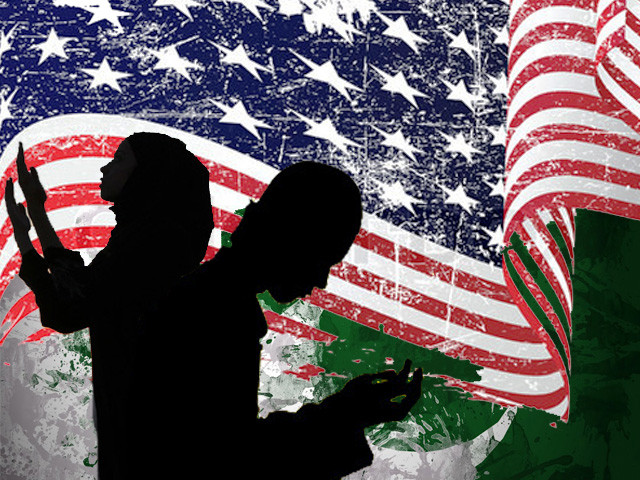The most awaited Islamic month, Ramazan, is here. Muslims around the globe observe this month in their own, unique way. In Pakistan, people are usually busy buying groceries, making regular trips to the tailors to get their Eid outfits stitched, setting up their houses, planning iftar parties and praying – all in that order.
Ramazan in the United States is celebrated differently, however. Muslims try to change their timings and cut down their work shifts so that they stay fresh for taraweeh prayers and late night qayaam. As an American Muslim, it is a great test to stay patient while fasting and dealing with non-Muslim customers and colleagues, especially when it comes to food and/or lunch breaks. But many non-Muslims know about the holy month and often wish me “Ramazan Mubarak” whenever I meet them, which is very overwhelming. This teaches us tolerance and inter-faith harmony. Ramazan in the United States has a charm around it that makes everyone happy.
However, this is not the case with Pakistan – not anymore at least. People here seem to have associated a negative feeling of fear with this month. They do not show much excitement about it. Instead, they are worried about the prices rocketing sky high. Some people start saving beforehand, just for Ramazan, because they know they will face difficulties later. It is sad that a month which should be dedicated to reciting the Holy Quran and staying up late for prayers is wasted away fretting over food and other expenses.
In the US, about two weeks before Ramazan, we start receiving pamphlets and flyers about ‘Ramazan deals’ from South Asian and Middle Eastern grocery stores/restaurants in our mail. The deals are incredibly economical and cater for the general public. Many Pakistani as well as Indian stores cut down food prices, especially on commodities such as juices, drinks and besan (gram flour).
Most Pakistani, Indian and Middle Eastern neighbourhoods break the fast at their local mosques. Many mosques in Los Angeles would organise iftar and sehri for their communities. The mosque collects a sum of money prior to Ramazan for water, ice, paper plates, bread, dates and the likes. These congregational iftars and sehris create a sense of unity and connection between Muslims in a particular area.
But in Muslim countries like Pakistan, the situation is completely the opposite. It is sad to see that fellow Muslims increase food prices and create more hurdles for their own people during the month. From dates, fruits, yogurt, bread and wheat to clothes, shoes and other accessories, everything is priced higher than the regular price as soon as Ramazan starts. It is supposed to be a month of blessings but this just ruins its entire essence.
When iftar is arranged at the mosque, we are served with a date, fruits, Moroccan soup and a bottle of water. The lesser we eat, the better it is, because when we chow down huge amounts of food after 16 hours of fasting and thirst, the food slows down our metabolism and makes us lazy. As a result, many do not feel like going to the mosque or praying taraweeh. But, in Pakistan, people attack their food as soon as the Maghrib call for prayer is made; there is no sense of restraint or moderation. This is not what Islam or Ramazan preaches.
In the US, popular Islamic organisations such as the Islamic Circle of North America (ICNA), the Islamic Relief USA (IRUSA), and the Council of American-Islamic Relations (CAIR), visit different mosques and collect funds for the needy. They make the donation process very easy, all we have to do is write down our credit card number and the donation amount on a piece of paper and give it to them, the rest is in their hands. The process is very transparent and this increases our will to donate more, from whatever we’ve got.
But I am always left confused when I spend Ramazan in Pakistan. Here, the emphasis is more on extravagant foods and iftar dinners than on helping the poor. The key is to feed the poor as much as possible and not just fill your own tummies. But it is seldom followed in Pakistan. What’s the use of this month then, if we are not even helping the underprivileged? The money that we spend on our parties can be used to feed a poor family.
In the US, late night prayers (qayaam) are organised for men and women at the mosque. Starting from the first Ramazan, people spend their nights at the mosque praying and reciting the Holy Quran. It is such a good way to make your connection better with the Lord. However, I have not seen the same trend in Pakistan as such.
The idea is that, no matter where we are, it is our duty to help the needy and make the most out of this sacred month. No matter where or how we celebrate it, we need to make sure that we pray and give away as much as we can, keeping the suffering of others in our minds and be tolerant with everyone around us. Why have we forgotten what Ramazan means?
Has Pakistan forgotten what Ramazan means?
It is sad that a month that should be dedicated to prayers is wasted away fretting over food and filling our tummies.



COMMENTS
Comments are moderated and generally will be posted if they are on-topic and not abusive.
For more information, please see our Comments FAQ